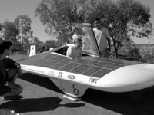In the Australian World Solar Challenge race that concluded on October 22, the MIT Solar Electric Vehicle Team's Manta GTX finished first in its class, first of US teams, first among teams using lead-acid batteries, and eighth overall out of 40 entries. Only 28 finished, but MIT's vehicle didn't experience a single breakdown during the six-day race from Darwin to Adelaide, and it ran at roughly twice the speed of the MIT entry 12 years ago.
Institute Professor Mildred Dresselhaus is the winner of the 1999 Nicholson Medal for Humanitarian Service -- presented by the Division of Plasma Physics and the Forum on Physics and Society division of the American Physics Society (APS) -- "for being a compassionate mentor and lifelong friend to young scientists; for setting high standards as researchers, teachers and citizens; and for promoting international ties in science." Professor Dresselhaus, who joined the faculty in 1967 and holds joint appointments in the Departments of Physics and Electrical Engineering and Computer Science, is a National Medal of Science recipient and holds 16 honorary degrees. Her current research focuses on carbon nanotubes, bismuth nanowires, low dimensional thermoelectricity, and novel forms of carbon.
Dr. Ascher H. Shapiro, Institute Professor emeritus and senior lecturer in mechanical engineering, has been awarded the Daniel C. Drucker Medal from the American Society of Mechanical Engineers. The award is conferred for "distinguished contributions to the field of applied mechanics and mechanical engineering over a substantial period of time." Professor Shapiro, who has been at MIT since 1938, is being recognized for advancing the understanding of pulsating and peristaltic fluid flows in the human vascular system. He did pioneering work on development of the intra-aortic balloon now commonly used to treat heart problems.
Professor Emeritus of Chemical and Food Engineering Marcus Karel recently received an honorary doctorate from the University of Helsinki. His award cited his "studies of chemistry of reactions causing undesirable changes in foods; modeling, simulation, and optimization of quality factors in food processing and storage; physical structure of foods, physical properties and their control in processing and storage; and enzyme reactions in various substrates."
The MIT Press will receive the Diana Award for the year 2000 next September. The Association for Computing Machinery Special Interest Group on Computer Documentation presents this award each year to an institution or organization that has made an outstanding lifetime contribution to the field of user documentation. In its decision to make the award, the organization particularly noted the books of Edward C. Barrett, senior lecturer in the Program in Writing and Humanistic Studies, as having made a contribution to this field.
Several people associated with the Department of Urban Studies and Planning received awards at the recent annual conference of the Association of Collegiate Schools of Planning (ACSP). Professor Emeritus and Senior Lecturer Lisa Peattie was recognized as Outstanding Planning Educator, and Professor Karen Polenske received the Margarita McCoy Award for outstanding service to women faculty at ACSP schools. Administrative Officer Rolf Engler was cited for outstanding service for ACSP. Sumila Gulyani (PhD 1998) won the Barclay Jones Award for best dissertation of the year, while graduate students Vinit Mukhija and Jennifer Johnson received Fannie Mae Travel Awards and Daniel Serda won the Fannie Mae Doctoral Dissertation Award.
Woodie C. Flowers, the Pappalardo Professor of Mechanical Engineering, has received the Edwin F. Church Medal from the American Society of Mechanical Engineers, given to one who has increased the value, importance and appeal of mechanical engineering education. Professor Flowers, who created the Introduction to Design subject and co-founded the national FIRST robotics competition, was cited for "promoting engineering education throughout the United States and inspiring young people to experience science and design engineering."
Professor Emeritus John G. King of physics is the 65th recipient of the 1999 Oersted Medal, the most prestigious award given annually by the American Association of Physics Teachers (AAPT). Professor King developed the popular first-year physics sequence, 8.01x and 8.02x, in 1988, which emphasizes take-home experiments. He also founded the Physics Project Lab, designed the Corridor Hall experiments that are continuing today as the Physics Showcase Boxes, and made numerous improvements to the freshman physics lab. He has also worked with organizations outside MIT to develop scientific playgrounds and science-based educational resources for grades K-12.
Amy Smith, a graduate student in mechanical engineering who invented a special incubator, was one of three winners in the 1999 BF Goodrich Collegiate Inventors Program. Ms. Smith's Phase-Change Incubator, a clinical apparatus that is able to maintain a constant temperature without requiring electricity, should prove advantageous for lab work in developing countries where electricity is not a reliable power source. For her work, Ms. Smith received $7,500. Her advisor, Professor Emeritus David Gordon Wilson, was awarded $2,500, which he donated to the fund supporting Ms. Smith's doctoral work. The BF Goodrich prizes were awarded September 17 at the annual induction weekend for the National Inventors Hall of Fame.
A version of this article appeared in MIT Tech Talk on November 3, 1999.






